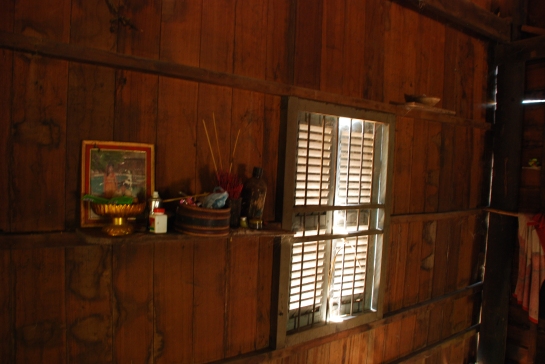
Is a cop’s job to discourage bad behavior or to punish bad behavior? The local policeman in Bakong showed a very wise sense of judgement.
A couple of years back a girl attending Savong’s School was harassed one evening by a group of local boys. Another student saw what was going on and the police were called from their station, a small building, not 200 meters away.
In a village like Bakong, 14 kms East of Siem Reap, everybody knows everyone. It didn’t take long for the policeman, a genial fellow, to work out who the boys were. He went to each of their families and ordered the young men (all unemployed,) to meet him on Thursday morning at his police station. He also asked the girl to attend, as well as her witnesses; students from Savong’s School.
At the meeting the policeman, a well-built middle aged man in his olive green uniform, wore a judicial frown. After asking the witnesses to positively identify the young men he gave them a stern lecture. It was a grave experience for each guilty party because their parents were on hand as well. The feeling of shame was palpable. The policeman pointed out that they were on a bad path; a path that could lead directly to jail, and everyone knows in Siem Reap that this is not a good place. He told the boys that he had it within his power to send the boys to prison right away. In fact he could see no reason why not to, he told them. The boys were on the precipice. There were gasps in the crowded room.
Then the policeman who single-handedly played the good-cop, bad-cop routine said something unexpected. “If the young student asks me to send you boys to jail, I will do so immediately. It is up to the girl and her friends.”
The students formed a huddle and clearly they too were shaken by the enormity of the consequences here. Jail? After a few moments they asked if they could take the problem away with them to school where they would discuss their response with their classmates. The policeman gave them to the next day, and ordered the young men to turn up, with their parents the next morning.
At Savong’s School the senior students discussed at length what would be suitable justice. Soon they came up with a fair response. And so they turned up at the Friday morning meeting at the small police station in Bakong.
“What is your decision?” asked the policeman.
The students outlined their thinking. That the boys were clearly guilty of serious behaviour – cornering the girl and being sexually suggestive – but that jail was too harsh. Their recommendation was to let the boys off “this time” but that next time they would not hesitate to recommend jail.
Everyone heaved a sigh of relief. The young men were suitably chastened and, no doubt, faced their forms of domestic justice from their parents who had been disgraced by their sons. The policeman let the boys know that they had been very lucky that the students had been so forgiving this time.
And so justice was dispensed and, to my knowledge, the boys have walked a straight and narrow path ever since.
I’m critical, deeply critical, of Cambodia’s weak justice system whereby the rich and powerful can apparently get away, scot free, after a hit and run accident, while a poor farmer can be jailed for years for protesting the illegal acquisition of his land and livelihood.
But on another level I totally admire the fair work of the local policeman in Bakong. His wisdom and local knowledge mean, I’m sure, that he has never needed to unlock the rifle cupboard that he keeps on show with its old Chinese army rifles. Neither did he press formal charges. Instead, knowledge, shame and a reminder of what “could happen” is armament enough for the policeman to keep the peace in this rural community.
For another story from Savong School – The boy who was nearly sold.
Or a story about An actual folk tale from Cambodia
If you enjoyed this true story about our project in Cambodia, don’t forget to press the FOLLOW button – we’d love your company.








You must be logged in to post a comment.